21 Of The Most Inspiring Quotes For Parents Raising Adopted Kids
Take these to heart.
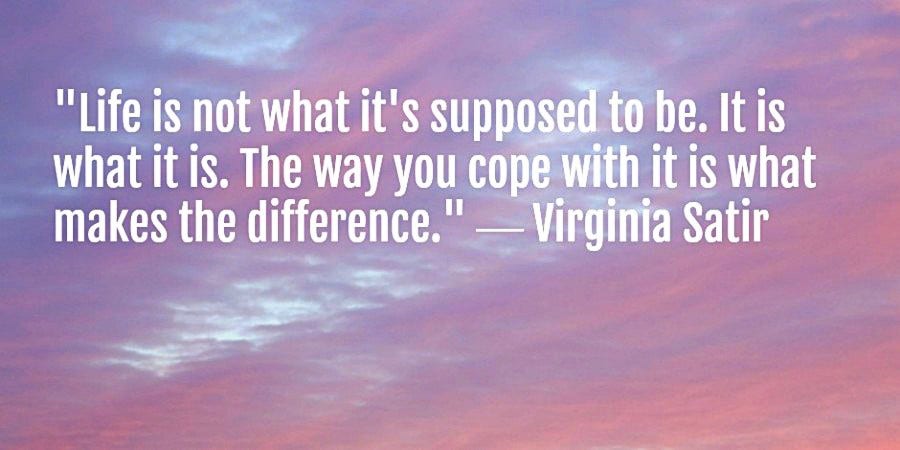
If you’re in the adoption sphere, then you already know there are some major differences between parenting an adopted child and a biological child.
Learning about these differences often causes fear and insecurities in adoptive parents, but, as these brilliant parenting quotes and pieces of parenting advice from experts show, these fears have little to do with the differences between raising an adopted child or a biological kid.
In fact, the differences aren't the issue at all. The issue lies in your ability as an adoptive parent to cope with them.
Here are 21 of the best parenting quotes and pieces of advice all adoptive parents should know:
1. Deal with your past.

"The best gift an adoptive couple can give their child is to work through their own issues of abandonment and loss [ ... which] greatly affect[s] how they act and react in their relationship to their child." — Nancy Verrier
From one of the best adoption books on the market, Nancy Verrier's overarching message is that before you try to fix your child's issues, you need to clean up your own past in order to be an effective parent.
2. Check your perspective.

"Problems are not problems. Coping is the problem." — Virginia Satir
How we experience life is a matter of perspective. What we define as a problem is merely our inability to cope based on the meaning we have given to it. What one complains about, another rejoices in.
3. Learn your child's love language.

"Love felt by the parent does not automatically translate into love experienced by the child." — Dr. Gabor Maté
Recognize that either your or your child's views of love could be skewed.
To some people, love means being protected and watched over — but to a kid, they could experience your protectiveness as being controlled. Or, perhaps your way of showing love is hugs, closeness, and bonding — but for a traumatized child, they could interpret these gestures oppositely and feel threatened instead.
4. Think beyond the more tangible aspects of raising a kid.

"There is a great deal more to preparing for an adopted child than fixing up a nursery or having money in the bank for a college education. There is a real need for emotional stability, honesty, and the willingness to become truly informed about what this process means for the adopting parents and for their child." — Nancy Verrier
It's all about finding emotional stability and cleaning up your past. If you don't, no amount of research will matter, because you will instinctively react to your child based on your wounds.
5. Do not project your own insecurities on your adopted kids.

"The provocative behavior (from adopted kids) often plays into the parent's insecurities about being good enough parents and into their own rejection issues. They then become defensive and retaliatory instead of understanding and steadfast." — Nancy Verrier
Your own childhood rejection issues can resurface in the midst of your adopted child's difficult behavior (because all kids push the boundaries). And when you cannot cope with your own feelings, you're more likely to react emotionally, rather than parenting with intent.
6. Recognize when your childhood wounds surface during parenting.

"What lingers from the parent's individual past unresolved or incomplete, often becomes part of her or his irrational parenting." — Virginia Satir
You’ve probably heard people say, "My kids trigger me." A trigger is a wound resurfaced and the child’s behavior transports the parent to a time of their own childhood when they were made to feel the same way. They then react to the child from that wounded place — hence ‘irrational parenting’.
To take it a step further, you will parent from the ‘age’ of the original wounding.
7. Work on your own issues first.

"Parents who experience difficulty with the child's feelings, as symbolized in his creative endeavors, need to seek therapy or a support group to work out their own feelings of rejection or betrayal." — Nancy Verrier
Realize that it's your own feelings you are objecting to, not those of your adopted child. Your kids’s behavior is bringing up memories of your unhealed past. Until it's dealt with, you will parent from that wounded place, and your child will suffer for the wrong doings of others.
8. Let go of your expectations for perfect parenting.

"Life is not what it's supposed to be. It is what it is. The way you cope with it is what makes the difference." — Virginia Satir
Life will not go the way you planned and having expectations is a cause for suffering. When you feel you are suffering, it skews your perceptions and thus affects your parenting.
9. Do not impose your hopes and wishes on your child.
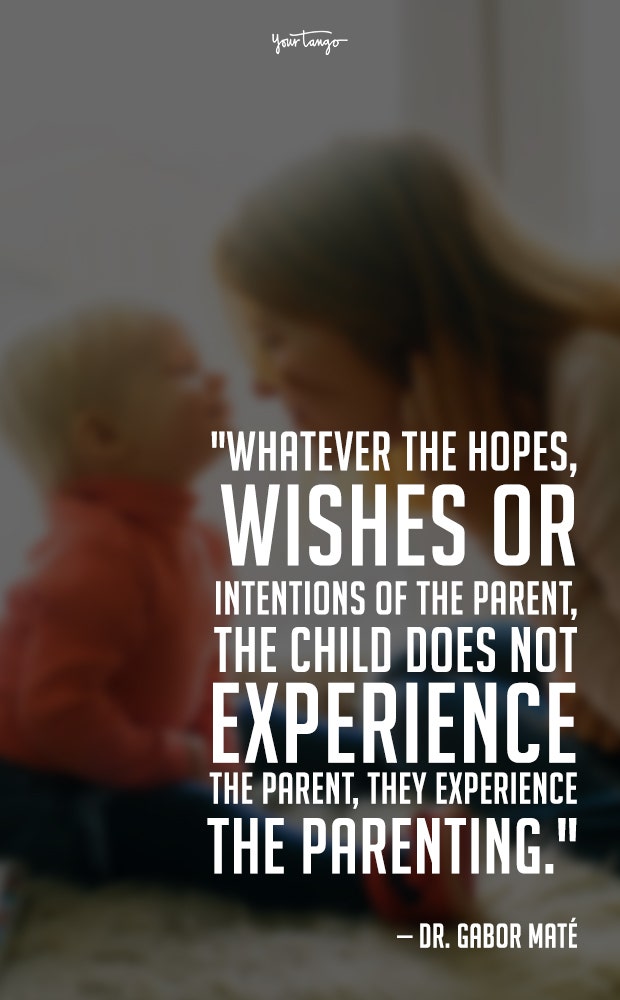
"Whatever the hopes, wishes or intentions of the parent, the child does not experience the parent, they experience the parenting." — Dr. Gabor Maté
You may want the best for your child and in doing so have certain expectations — this is your first mistake. The child doesn't understand these expectations and nor should they. Therefore, they only experience what they interpret as consequences.
As a parent, your hopes and wishes for the child should not be imposed on them. Accept them for who they want to be, and then, they will feel love and connection.
10. Be emotionally available.
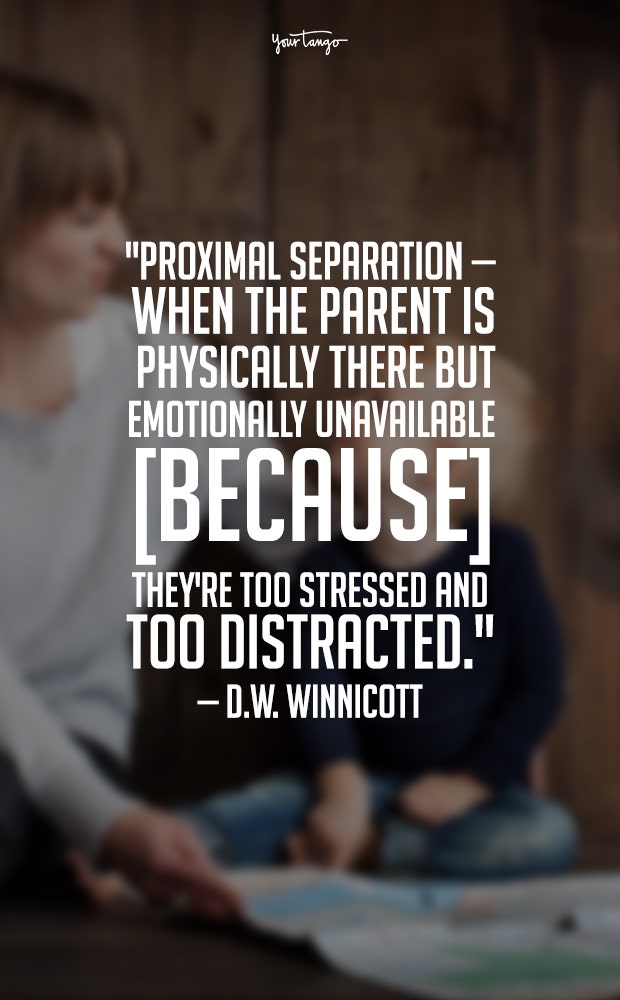
"Proximal separation — when the parent is physically there but emotionally unavailable [because] they're too stressed and too distracted." — D.W. Winnicott
According to influential English pediatrician D.W. Winnicott, happiness and future satisfaction of the human race depended ultimately not so much on external political issues, but on something far closer to home: the way parents bring up their children.
So, through sickness and health, be there for your child. The road to a better society begins in the nursery.
11. Accept your child wholeheartedly.

"Acceptance of your child as-is is the first step to a connection." — Dr. Shefali (Tsabary)
Lose all expectations, intentions hopes and wishes for your child. Follow their lead and accept them and their history as it is.
Of course, you can want the best for them — but let them find what their best is. Then, you can guide them from that place while building a connection.
12. Understand how stress affects your child.
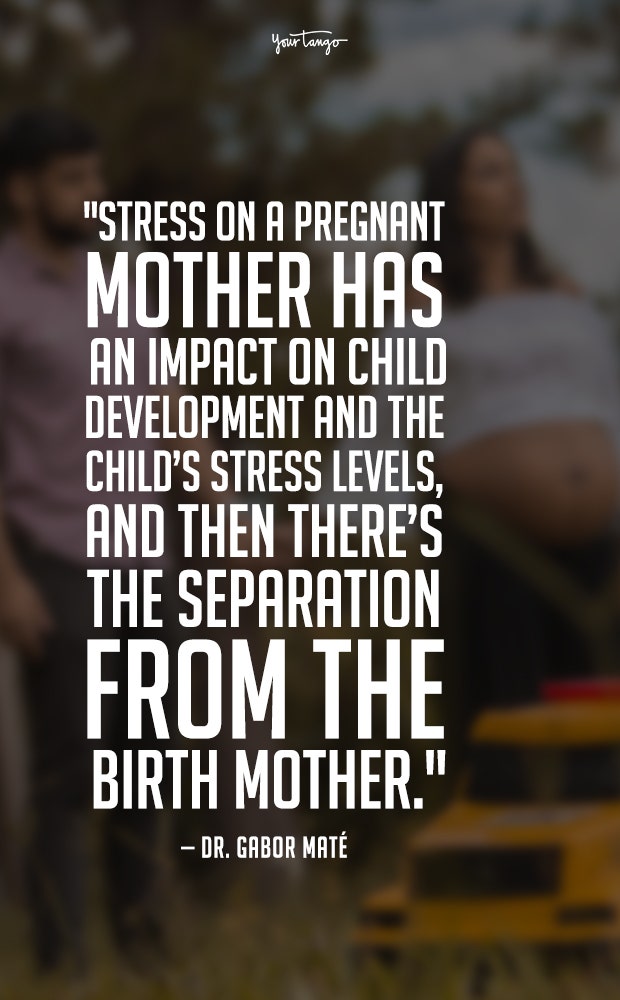
"Stress on a pregnant mother has an impact on child development and the child’s stress levels, and then there’s the separation from the birth mother." — Dr. Gabor Maté
Understand that in the psyche of the child is this stress and it will appear — sometimes in unexpected ways.
13. Let go of your parenting fears.

"Once we release our fears as a parent, we can walk with our children as their students and fellow travelers. That is the ultimate purpose of parenting." — Dr. Shefali
Given the many layers of complexities in adoption, the trauma, and their wounds, many adoptive parents are scared that they won’t be enough for their kids and they feel unprepared.
An adoptee's trauma remains but with your help, their wounds can heal — but you need to be whole, first.
14. Ask yourself if you're really ready for children.

"I barely have time for my own children. To adopt more children and not have time for them, that would be poor parenting on my part." — Mary J. Blige
If you don’t have time now to do what you need to do in life, adding another child — especially an adopted child — will lead to poor results. The issue of abandonment could become the forefront of your family life.
15. Don't try to control your child.

"Love without consciousness becomes need dependency [...and] control in the name of love." — Dr. Shefali
Having consciousness means being free of past pains, as well as being aware of and healing from your own unresolved issues. Otherwise, love is expressed through controlling actions when you meet your own needs, while sacrificing the needs of the child.
16. Realize that you parent from a place of how you feel about yourself.
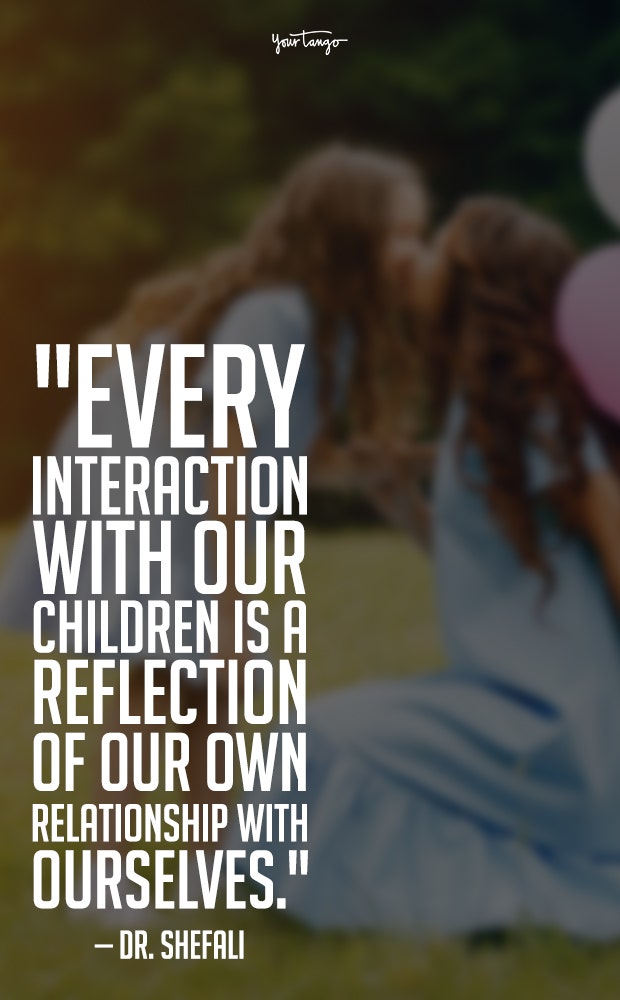
"Every interaction with our children is a reflection of our own relationship with ourselves." — Dr. Shefali
How you react to your child is directly related to how you feel about yourself. And how you feel about yourself is linked to how you were made to feel when you were a child.
Swiss psychiatrist and psychoanalyst Carl Jung believed that a person’s past and childhood experiences determine future behavior.
17. Be aware that your kids will irritate you at some point.

"There is no parent out there who hasn't complained about their kids irritating them. The question to ask yourself is ‘What is it (exactly) that irritates me?" — Dr. Shefali
Something from your past will resurface in those moments. The key is to correct these irritants before you have kids.
What irritates you in daily life will be the same things that your kids do to irritate. The circumstances are different, but the root is the same.
18. Learn a new way to parent that's better suited for your child.

"If we use how we were taught yesterday to teach our children today, we are not preparing them well for tomorrow." — Dr. Dan Siegel
Everyone knows the old parenting paradigm doesn't work, yet it gets repeated generation after generation. Then we blame the kids for bad behavior when, in fact, it’s learned behavior.
If you don’t want to parent the way you were parented, you’ve got to find a new way. In order to find a new way, you’ve got to rewire and reprogram your brain.
19. Know about your child's past trauma.
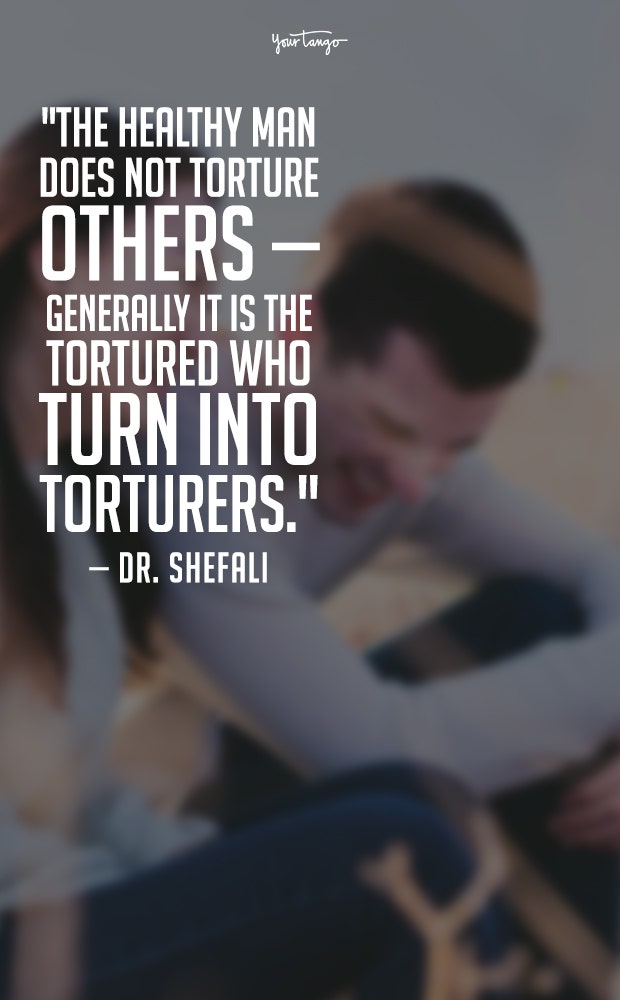
"The healthy man does not torture others — generally it is the tortured who turn into torturers." — Dr. Shefali
In other words, hurt people hurt people. The hardest people to love are the people that need love the most.
With adopted children, you do not know how they will react to their trauma. Understanding this will give you the space to accept that their behavior is a symptom of pain.
20. Help your child in any way you can.

"Peace comes from helping our children not acquire our negative programs." — Dr. Bruce Lipton
We all have negative programming from our past buried in our subconscious mind. Traumas are stored in our nervous system. Left unhealed, you will pass them down to your children because it is from those programs you will parent. This can be devastating to an adopted child, who will begin their new life with trauma.
21. Be a good role model.
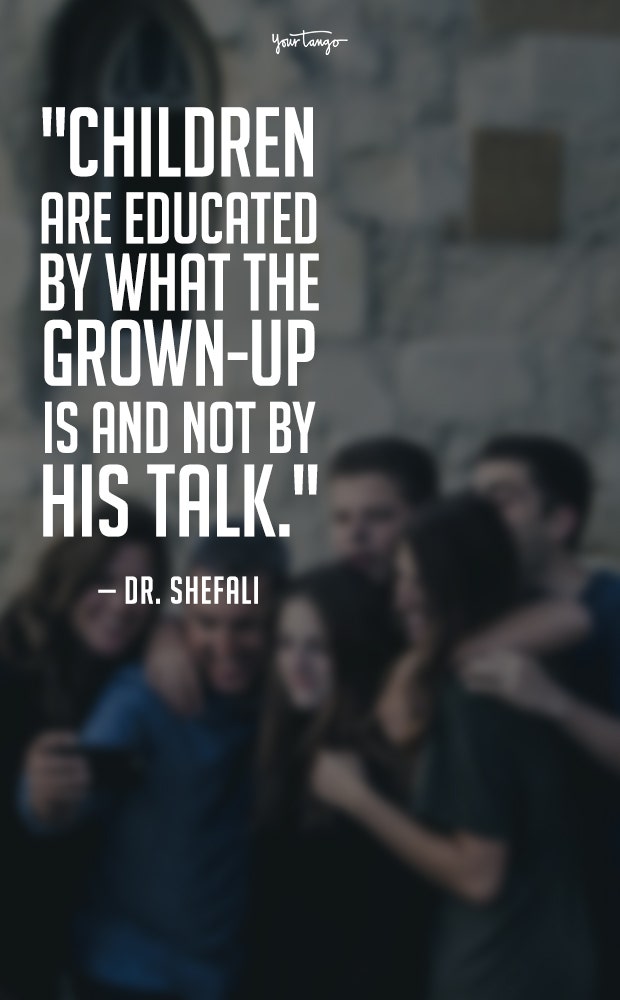
"Children are educated by what the grown-up is and not by his talk." — Dr. Shefali
We’ve all heard the saying, "Actions speak louder than words."
Kids model the behavior of adults. It is crucial in their formative years to model intention and congruence, especially for an adoptee. You cannot model congruence as long as you’re fighting your past demons.
Parenting an adopted child is more than just being informed.
Reading books does not change your wiring, and it is through your wiring which you will parent. Yes, as you read, you will gain empathy, but when a situation arises, you have no other option than to revert back to your old programs.
In order to be the best adoptive parent to your child, you must do the inner work required to release those beliefs so you can find and focus on your strengths.
And for that, your child will thank you.
Suzanne Jones is an adoptive parenting coach and mother of three. As an adoptee herself, her mission is to help fearful adoptive parents become more confident in their parenting skills and learn the tools they need to best meet the needs of their adopted child. You can connect with Suzanne to learn more about raising a happy, healthy adopted child or read her free e-book, Debunking The Adoption Myth.
YourTango may earn an affiliate commission if you buy something through links featured in this article.
